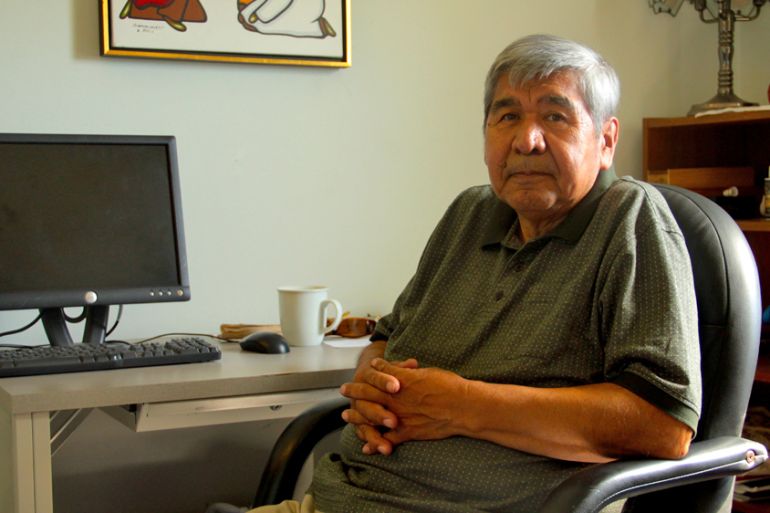Canada’s dark history of abuse at residential schools
Truth and Reconciliation Commission finds Canada guilty of ‘cultural genocide’ and abuse of Aboriginals.

Canada’s Truth and Reconciliation Commission released its final report accusing the government of committing “cultural genocide” against indigenous survivors of the government’s brutal residential school system .
It was a damning indictment of Canada’s role in forcing some 154,000 Aboriginal children into those schools between 1874 and 1996.
Keep reading
list of 4 itemsMasked Tunisian police arrest prominent lawyer for media comments
Gaza’s mass graves: Is the truth being uncovered?
Tunisia: The migration trap
They were separated from family, culture and their Aboriginal identity, and suffered physical and sexual abuse. It is estimated 6,000 children died while in these schools.
Andrew Wesley, a Cree native from Fort Albany, Ontario was one of the children who attended residential schools. At 69, he remembers his childhood and the schools that he said were meant “to take the Indian out the child”, and to assimilate them into Canada’s “white” mainstream.
|
|
| Canada accused of ‘cultural genocide’ |
Wesley said the root cause of the violence within Aboriginal communities today – domestic abuse, physical and sexual violence, even murder – was caused by the violent history in those schools and the large number of indigenous children abused there.
Now an Anglican priest who helps the homeless, he spoke to Al Jazeera about the abuse he suffered – and his road to recovery.
Al Jazeera: What was your first abusive experience at residential school?
Wesley: What I remember, the abuse about St Anne’s, is the way I was treated as a little boy coming off the bush, especially when we had the first meal.
I never ate corn in my life and I kind of threw up on the floor. The child-care worker came over and saw what happened, and so she told me to eat my vomit on the floor, and she was hitting me at the same time.
So I did that and of course it tasted awful so I threw up again for the second time, so I again had to eat my vomit. It was terrible. I wasn’t the only student that was treated like that, there were many of the boys. There was also sex abuse but I never faced that kind of abuse, but I know other students had, including my younger brother that suffered sexual abuse.
Al Jazeera: You say the abuse so many aboriginals suffered in those schools continues to affect the community today. How so?
Wesley: In our community today there is lots of violence happening, and I think that has to be contributed to the residential schools. We never really had the teaching of being a parent. We become aggressive in bringing up our children, and in turn we teach our children to be aggressive.
Because of that experience, us survivors never learned how to live as a loving family because we were separate from our family. We didn’t know how to love because we were never treated like a child would be treated at home. Because of the treatment we received we became violent in our growth.
Al Jazeera: How did you survive the seven years you spent in residential school?
Wesley: I know when I first went in [the schools], I never heard anything about cheating or lying. In order to escape any kind of physical harm, you cheated, you lied, in order to survive or stay away from the abuse, that’s what happened to many of us.
So as we grew up we carried that pain. As we became teenagers, we carried that pain without being able to handle our guilt that we were considered bad, we were ashamed, we were humiliated, we were dehumanised many of us, so we carried the guilt feelings as we grew up because of what happened.
Al Jazeera: How did you find your way back from the abuse you suffered. What was the healing process?
![Truth and Reconciliation Commission report into abuse of Aboriginals [TRC]](/wp-content/uploads/2015/06/88e9658b369a49edb4c413e48d262656_18.jpeg)
Wesley: The first thing that I did in order to start healing was to look at where my anger was coming from so I went to see an elder back home and he spent time with me. He told me the anger was coming from that little child in me that was beaten up, because I never protected that child. I never tried to defend myself. He told me to talk to the child more often, be nice to the child, tell him that nobody is going to touch him any more, nobody is going to harm that little guy any more and that’s what I did.
And along the way of my healing journey, I decided to go and see my abuser. She was living close to me at that time where I was living. One time I saw her coming from the store. I approached her and asked her, “Do you remember when you used to beat me when I was in school?” She said, “I remember.” So I said, “I forgive you for what you did.” She was an older person at that time. She never acknowledged my forgiveness to her. But that encounter really helped me out in my healing journey.